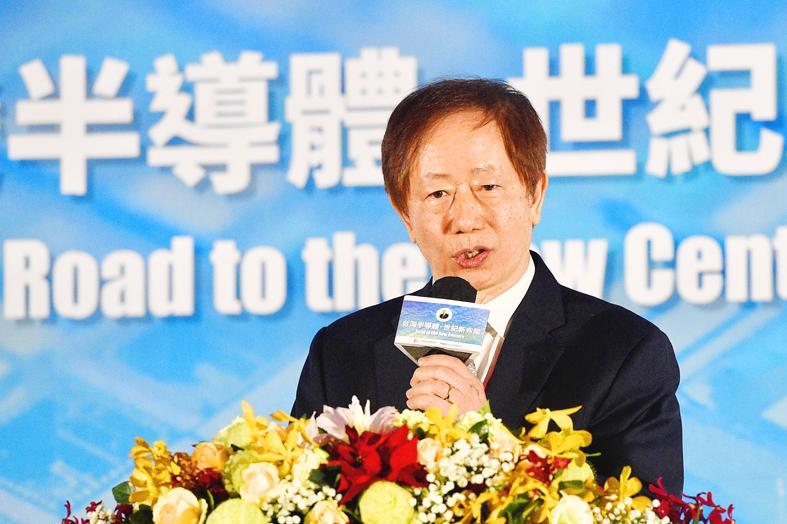Mark Liu (劉德音), former chairman of Taiwan Semiconductor Manufacturing Co (TSMC), has founded an academic center at the University of California, Berkeley to enhance US tech competitiveness.
The Technology Competitiveness and Industrial Policy Center (TCIP), founded and supported by Liu, was announced by the university in a news release on Thursday last week.
“Over the past several decades, globalization has decoupled upstream research from downstream manufacturing of high-technology products. As a result, new innovations do not necessarily translate into wealth creation,” Liu said in the statement.

Photo: George Tsorng, Taipei Times
“With the ever-increasing dependence of society on technology, this separation is eroding our nation's technology leadership, the cornerstone of economic power and security,” Liu said.
“A national strategy is needed to strengthen the pipeline from research to product development and manufacturing, and to ensure end-market access,” he said.
The TCIP would provide “expert, independent scholarly advice to policymakers and lawmakers on technology policy development” to ensure US leadership in areas such as tech research and development and advanced manufacturing, the release said.
The new center was established under the university's College of Engineering and would convene experts in technology, economics and policy from academia, the industrial sector and non-profits, the release said.
After the recent “disruption” from China's introduction of DeepSeek, it is “increasingly imperative to restore US leadership in advanced technology — including artificial intelligence — and this center will accelerate progress toward this goal,” said S. Shankar Sastry, a computer science professor at the university who would serve as the center's faculty director.
Liu, who was born and raised in Taiwan and attended graduate school at UC Berkeley, served as chairman of TSMC from 2018 to last year.

An alleged US government plan to encourage Taiwan Semiconductor Manufacturing Co (TSMC) to form a joint venture with Intel to boost US chipmaking would place the Taiwanese foundry giant in a more disadvantageous position than proposed tariffs on imported chips, a semiconductor expert said yesterday. If TSMC forms a joint venture with its US rival, it faces the risk of technology outflow, said Liu Pei-chen (劉佩真), a researcher at the Taiwan Industry Economics Database of the Taiwan Institute of Economic Research. A report by international financial services firm Baird said that Asia semiconductor supply chain talks suggest that the US government would

WANG RELEASED: A police investigation showed that an organized crime group allegedly taught their clients how to pretend to be sick during medical exams Actor Darren Wang (王大陸) and 11 others were released on bail yesterday, after being questioned for allegedly dodging compulsory military service or forging documents to help others avoid serving. Wang, 33, was catapulted into stardom for his role in the coming-of-age film Our Times (我的少女時代). Lately, he has been focusing on developing his entertainment career in China. The New Taipei District Prosecutors’ Office last month began investigating an organized crime group that is allegedly helping men dodge compulsory military service using falsified documents. Police in New Taipei City Yonghe Precinct at the end of last month arrested the main suspect,

Starlux Airlines on Tuesday announced it is to launch new direct flights from Taiwan Taoyuan International Airport to Ontario, California, on June 2. The carrier said it plans to deploy the new-generation Airbus A350 on the Taipei-Ontario route. The Airbus A350 features a total of 306 seats, including four in first class, 26 in business class, 36 in premium economy and 240 in economy. According to Starlux’s initial schedule, four flights would run between Taoyuan and Ontario per week: Monday, Wednesday, Friday and Saturday. Flights are to depart from Taoyuan at 8:05pm and arrive in California at 5:05pm (local time), while return flights

LITTORAL REGIMENTS: The US Marine Corps is transitioning to an ‘island hopping’ strategy to counterattack Beijing’s area denial strategy The US Marine Corps (USMC) has introduced new anti-drone systems to bolster air defense in the Pacific island chain amid growing Chinese military influence in the region, The Telegraph reported on Sunday. The new Marine Air Defense Integrated System (MADIS) Mk 1 is being developed to counter “the growing menace of unmanned aerial systems,” it cited the Marine Corps as saying. China has constructed a powerful defense mechanism in the Pacific Ocean west of the first island chain by deploying weapons such as rockets, submarines and anti-ship missiles — which is part of its anti-access/area denial (A2/AD) strategy against adversaries — the